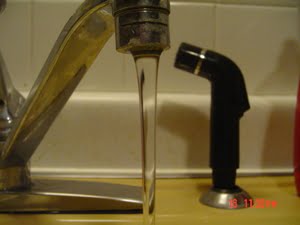It is possible to drink too much water and can actually be deadly. The old notion to drink, drink, drink as much water as possible is now being reconsidered. And, with good cause. Too much water has been shown to be the cause of death for several fraternity pledges (through hazing incidents that involve forcing the pledges to consume large quantities of water) and athletes. It’s always been said and I’ve heard it many times myself, that drinking water was your best bet during strenuous exercise. Now, we have to be concerned with how much is too much.
The condition of your body when you’ve consumed too much water is called hyponatremia or “water intoxication.” This occurs when an abundance of water causes salt in the blood to become diluted. Add this to the fact that we sweat salt and it’s easy to see why the amount of sodium our bodies need would decrease. This decrease can cause swelling in the brain that can lead to coma or death.
This condition is most common among athletes that participate in long distance events, such as running or cycling. The runner that is moving at a slower pace is said to be at an even greater risk due to the fact that they do not need the same amount of fluid replacement as the faster runner and yet they seem to consume more than their faster peers possibly due to having more chances to.
The trick when participating in strenuous exercise or activity is to get the right amount of fluids. Eight to sixteen ounces is a good guideline, but there are other factors to consider. These factors would include how much you sweat, your size, weight, climate, and the level of activity you are participating in. Typically, a person will lose weight during exercise, especially if it is a distance event. Weigh yourself before you begin. If after the event is over, your weight is the same or you have gained, you have probably drank too much and are over-hydrated.
Hyponatremia is becoming more and more common as fears of dehydration increase among athletes and the exercising public. There are a few things you can do to prevent this from happening to you. Decrease the amount of fluids you consume if you determine your after exercise weight is higher or the same as the pre-exercise weight. Opt for sports drinks that contain sodium instead of plain water. This will ensure that the salt you are sweating is getting replaced. Most importantly, listen to your body. It’s designed well and likely to let you know when you are thirsty. If you have questions or concerns about how much water you need for your lifestyle and exercise regime, it’s best to discuss the concerns with your doctor. Your life is worth it.
